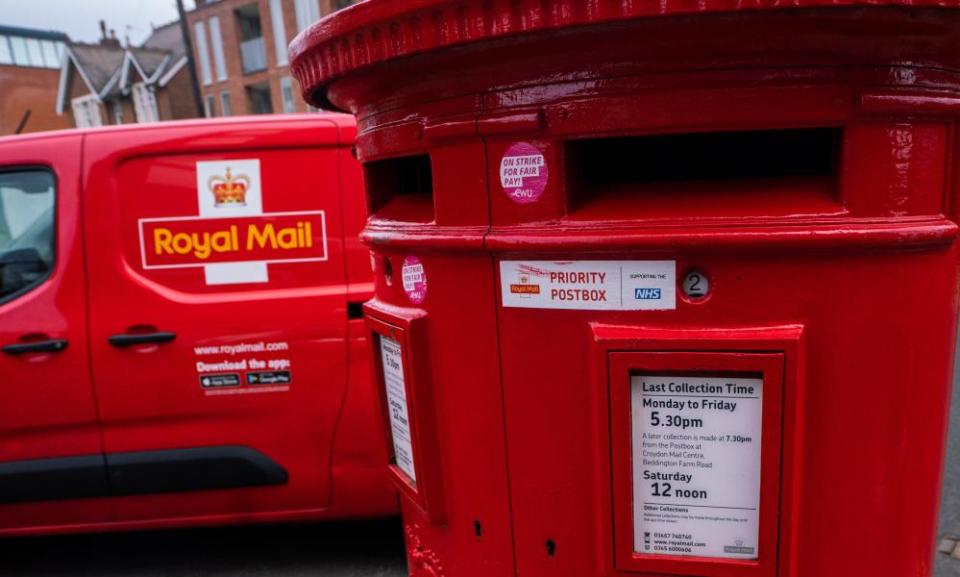Royal Mail launches Christmas punctuality bonus as losses soar

Royal Mail has launched a bonus scheme worth up to £500 a worker in an attempt to meet delivery targets over Christmas, as its owner’s losses more than doubled in the first half of the financial year.
Some employees could earn up to £500 extra for “hitting local and national quality targets”, in what Royal Mail’s renamed parent company, International Distributions Services (IDS), described as a “one-off quality incentive scheme” to try to avoid a repeat of last Christmas, when days of strikes disrupted deliveries.
Royal Mail’s performance has slumped amid the worker discontent. The regulator Ofcom on Monday fined it £5.6m for missing targets for punctual deliveries of letters by a wide margin: only 74% of first-class letters arrived on time in the 2022-23 financial year, far below its statutory target of 93%.
Related: Ofcom hits Royal Mail with a regulatory twig | Nils Pratley
Royal Mail has been plagued by poor performance for several years, as it tries to adjust to declining letter volumes and refocus on delivering parcels for online shopping, as well as dealing with industrial action.
Revenues at Royal Mail dropped by 2.9% to £3.5bn in the half year to 24 September compared with last year, while adjusted operating losses rose by 46% to £319m. IDS’s overall adjusted losses before tax more than doubled from £80m to £186m.
Tackling the losses at Royal Mail is the key task facing Martin Seidenberg, who was appointed as chief executive of IDS in July. He is the latest in a series of bosses tasked with turning around the UK’s regulated postal service.
The company said in May that the then Royal Mail boss Simon Thompson would remain with the business until the end of October. Seidenberg told the Guardian he had not met Thompson since arriving and had “taken over the ownership” of Royal Mail until a dedicated chief executive for the division was found.
The service managed to soften the impact of declining letter deliveries by raising prices, but it said that parcel revenues also fell during the period “due to weaker macroeconomic environment” and also because of the loss of customers during the extended period of disruption during strikes last year.
An internal campaign, straplined “We are Christmas”, has been launched in an effort to deliver a strong performance over the festive period.
In a separate move, workers will begin to start up to 90 minutes later from April. Seidenberg said it would not necessarily mean that UK residents should expect their post in the afternoon, but added that the move would allow the carrier to halve the number of chartered mail flights a day to 18, cutting costs and reducing its impact on the environment.
IDS’s other business, the international parcels distributor GLS, reported an adjusted operating profit of £150m.
Seidenberg said: “We have two businesses with great potential – Royal Mail and GLS. Three months into the job I am more convinced of that than ever. When I arrived, I took action to stabilise Royal Mail, after performance had suffered due to industrial action and customer losses.
“We’ve delivered on that plan through rigorous cash management, controlling our costs and ruthlessly prioritising high-return projects.”
He said improving Royal Mail’s punctuality was the “top priority”. The company is hiring more permanent staff to replace some temporary contractors, plus another 16,000 seasonal workers.
However, Seidenberg said the changes would “take time” despite “good progress” in implementing an agreement with the Communication Workers Union.
The company also renewed its plea for the regulator to allow it to drop a legal requirement to deliver letters on Saturdays. Royal Mail argues that the universal service obligation, a legacy of its status as a public service before its controversial 2013 privatisation, is “simply not sustainable” because of a decline in volumes from a system designed for 20bn letters compared with annual deliveries of 7bn.
IDS’s largest shareholder is Vesa, the investment vehicle of Czech billionaire Daniel Křetínský. “Naturally there is an interest of Vesa to interact with me and what my plans are,” Seidenberg said.
This month, it emerged that Royal Mail would lose its 360-year-old monopoly on delivering parcels from Post Office branches, after concerns about poor quality of service persuaded the chain to sign deals with rivals Evri and DPD in the run-up to Christmas.

 Yahoo Finance
Yahoo Finance 